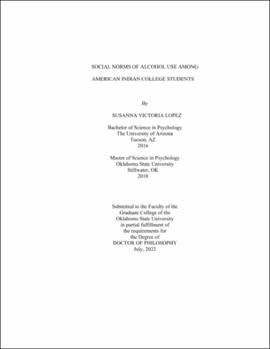| dc.description.abstract | American Indian (AI) peoples are at higher risk for alcohol use disorder and related health consequences compared to the general population. Descriptive and injunctive norms have been found to be a significant risk factor for high-risk drinking, especially among college students. However, this research has rarely been extended to the AI college student population. The current study aimed to analyze descriptive and injunctive reference groups, or groups from which to draw normative information. The current study further investigated ethnic identity, or strength of one’s ties to their AI culture, as a moderator between norms and actual drinking patterns. Undergraduate AI students (N = 356) from a Southern Plains university completed an online survey assessing drinking patterns, descriptive norms (best male/female friend, typical male/female college student, typical AI male/female college student), injunctive norms (typical male/female college student, typical AI male/female college student), and ethnic identity. Repeated ANOVAs revealed that, compared to actual drinking levels, students overestimated all descriptive norm reference groups except for best female friend. Compared to actual injunctive norms, students further overestimated all injunctive norm groups except for AI female norms. Notably, students estimated lower drinking levels for AI-specific groups than typical student groups. Negative binomial regressions revealed descriptive AI male and best male friend reference groups significantly predicted actual drinking patterns for men, while only best female friend norms predicted actual drinking patterns for women. Lastly, ethnic identity was unrelated to drinking and did not serve as a significant moderator between norms and drinking. Findings may be used to inform brief norms-based interventions, as AI-specific reference groups may have a bigger impact on reducing drinking among men, but not women. Further research on the role of ethnic identity on drinking is warranted. Results suggest the use of different reference groups for AI men and women in brief, norms-based alcohol interventions. | |
